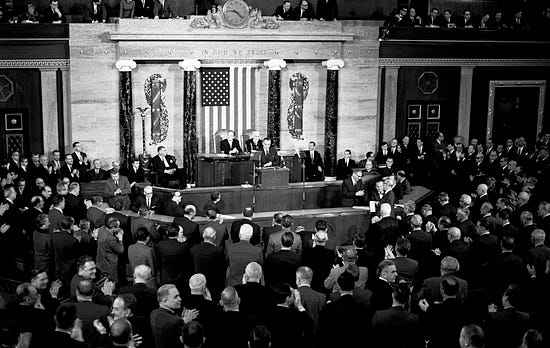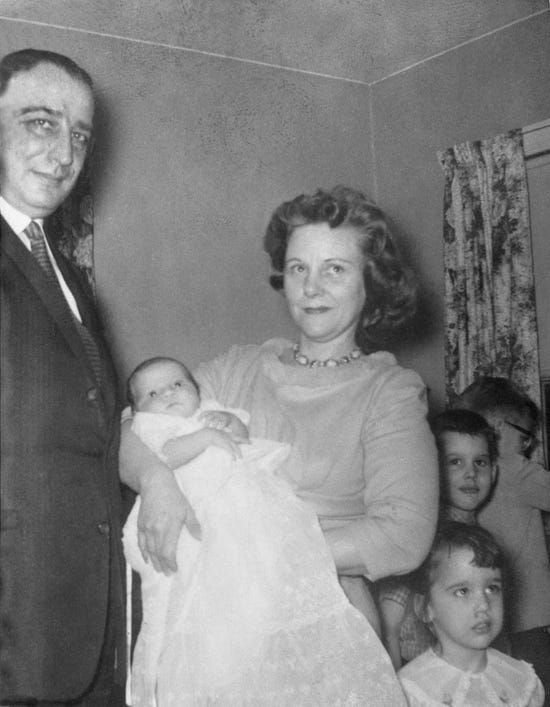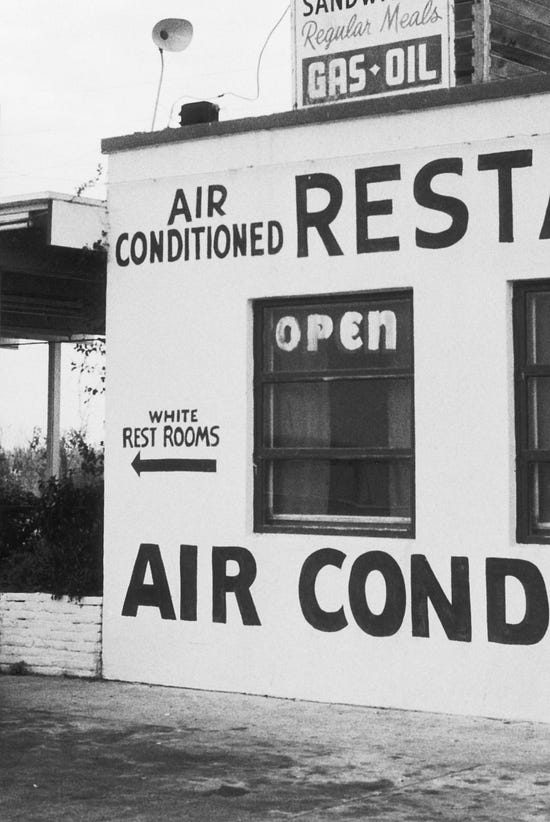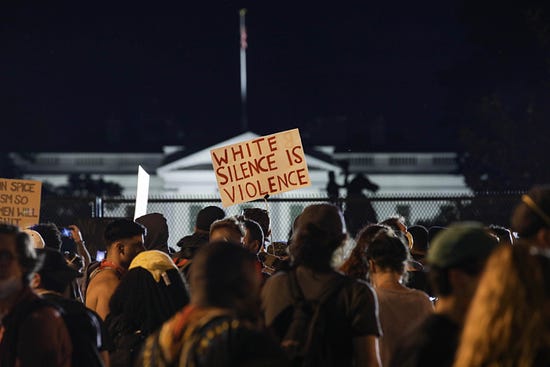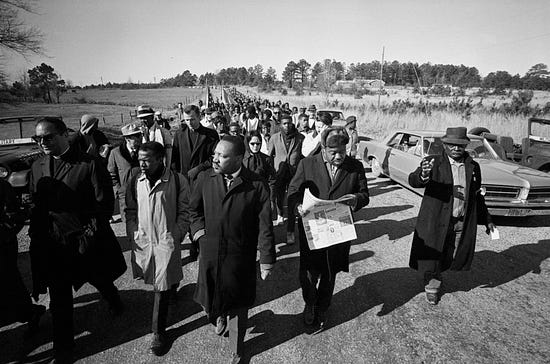President Johnson addressing Congress on the Voting Rights Act in 1965. Photograph by Cecil Stoughton.
I was in the room, as they say, where it happened.
I was, at 11-years old, a witness to history.
A history that tomorrow, in the United States Senate, is about to be debased and pulverized.
In the summer of 1965, I, the son of an autoworker and a clerk, sat inside the United States House of Representatives, perched over a railing, looking down on the distinguished 435 members of Congress below — 6 of them Black, 429 of them not — as they argued over who should have the right to vote (or to put it more bluntly, “do Negroes really get to have a say?”)
For 346 years, since the first slave ship in 1619 docked at Point Comfort, Virginia, there was never any real thought given to the idea of Black people voting. If they lived in the North, fine, why not — just don’t think you’re the same as us. And if they lived in the South, well, STFU! In 1964, just 5% of Black Americans in Mississippi were allowed to vote.
I had arrived that day in the summer of 1965 inside the U.S. House of Representatives because my mother thought my sisters and I needed a government lesson.
My mother’s love of this country, its democracy, and its political institutions was always evident. She saw it as part of her parental responsibility to school us in the values of a democratic republic, specifically this one, the United States of America.
When I finished fifth grade in that summer of 1965, she loaded my sisters and me into our Buick and drove us from Flint to our nation’s capital for our summer vacation. While the other kids in the neighborhood got to go “up north” or to Scout camp or to Tot Lot, we were forced to go see the original documents of the Founding Fathers, the first flag sewn by Betsy Ross, the plane that Charles Lindbergh flew across the Atlantic. We took the FBI tour at the Department of Justice, we had our picture taken in front of the Iwo Jima statue, and we knelt and prayed in Arlington at the grave of our fallen Catholic president. We traipsed from one end of Pennsylvania Avenue to the other, climbed all 896 steps of the Washington Monument, and then we were off to the Capitol Building to pay a visit to our Senator from Michigan, Phillip Hart, shake his hand and pick up some free tickets to get into the Senate and watch the goings-on.
With tickets in hand, we were off to sit in the Senate gallery and watch what we were told would be a debate over the passage of a new law that would pay the doctor bills of every single senior citizen, a radical idea to be sure. They called it “Medicare,” and the idea seemed to unsettle a number of the politicians on the floor, some saying it was the first step toward something called “socialism.” My sisters and I had no idea what that was; we just knew it was a bad word.
“This law will also help poor people,” our mother added, and although that wasn’t us, by the tenets of our Church it was considered a good thing, even if it did conflict with the principles of Mom’s Republican Party. The bill passed, and one Congressman proclaimed that the elderly would never have to worry again about going broke because of medical bills.
We went back to Capitol Hill the next day and met our Congressman from Flint, Rep. John C. Mackie. He, too, gave us tickets to that day’s House session. His aide ushered us into our seats in the House gallery. The new bill that was up for discussion was called “The Voting Rights Act of 1965.”
From watching the evening news and having been taught by my mother to read the daily newspaper, I knew that those whom the media called “colored people” were being unfairly treated, even killed, for trying to obtain their civil rights and their right to vote.
A few months earlier, in March of 1965, a white housewife from Detroit, Viola Liuzzo, upset at what she had been seeing on the television regarding the savage treatment of Black people at a march down South, made an impromptu decision to head down to Selma, Alabama, to march with the Rev. Martin Luther King, Jr. I knew King to be the Black man in charge of the civil rights movement, and in the town where I lived his name was rarely mentioned — and when it was, it usually had other words attached to it, none pleasant.
Viola Liuzzo, pictured with her children (Bettman/Contributor via Getty Images)
Mrs. Liuzzo, a mother of five children, was only in Selma for just a few days before she was brutally murdered by the Ku Klux Klan while volunteering as one of the drivers who ferried demonstrators back and forth to Selma. It was a shock to most of Michigan, and when I heard it being discussed by Jesse, the town barber, he informed those who were getting their hair cut that day that she was found with, “some n—— boy in the car, a married woman up to no good and sticking her puss in where it don’t belong.” Jesse’s Barber Shop was the place you went for enlightenment in the area, and the place was always full. Jesse was a short man with a short haircut, and there was always a pair of scissors or a long razor in his hand. This was problematic, as he wore thick-lensed glasses, the kind the legally blind wore, and it frightened me when I sat in his chair as he held court, the sharp instruments being used to make various punctuation points into the random air near my head.
For many nights after Mrs. Liuzzo’s murder, I could not sleep, and when I did, I had dreams that it was my mother found dead in the car alongside the road in Alabama. I told my parents of this, and they suggested I give the news-watching a break, but I nonetheless continued to tune in to Walter Cronkite each night.
It was confusing for me and my sisters, sitting in the House gallery, listening to men talking about how, “it isn’t the federal government’s business” to decide who gets to vote.
“Why don’t they want people to vote?” I asked my mother.
“Some people don’t want some people to vote,” she said, trying to protect me from the fact that even members of the United States Congress could think like the men who killed Viola Liuzzo.
Suddenly a man with a gavel called for a “roll call vote.” As names were called one by one, my eyes widened and then widened some more. And then the voting stopped — and amazingly, a whopping 333 members of the House of Representatives had voted YES and passed the Voting Rights Act of 1965! There was a cheer from the Black Americans in the gallery next to us, and I remember saying to my younger sisters, “I think something very, very important just happened.” I looked across to the other side of our aisle where a Black woman sat. Tears were running down her cheeks. “Why is she sad,” I thought, missing the fact that those were tears of joy, and also that I was not fully aware of this historic moment I was in. This would later be understood to be one of the three or four most important pieces of legislation of the 20th century.
A few weeks later the president signed the Voting Rights Act and for the first time in my country, the right to vote for people who were not white was now thoroughly protected by the Federal Government. (That protection would last for a total of three years, until Nixon’s “Southern Strategy” took over, and those rights eventually, slowly, began to be whittled away, never again to be returned to the strength of that Bill we kids watched pass into Law.)
The next day, after the big vote, we took an overly long and punishingly hot car ride down to Monticello, the home of Thomas Jefferson. This historic site, located about two hours southwest of Washington, deep in the state of Virginia, took us into the beginnings of the “Real South,” as our mother called it. The tour through the estate at Monticello was mostly unmemorable, except for the too-short doorways that indicated people two hundred years ago were not that tall or wide, and the glaring omission of any mention of Jefferson’s slaves.
A sign outside an American gas Station and diner points to the 'White Rest Rooms', circa 1960.
On the way back to D.C. we pulled off the highway for gas and for a trip to the restroom. I walked with my mother and sisters around to the back of the station, where there were two doors. One was marked WHITE and the other COLORED. I stood and stared at these signs, and although I knew what it meant, I wanted to hear my mother’s explanation of it.
“What is this?” I asked.
She looked at the signs and was silent for a moment. “You know what it is,” she said curtly. “Just go in there and do your business and get out.” I went into the “Colored” bathroom and she and my sisters went into the “White.” When we came out, she rushed us back to the car.
“Get in there and stay with your sisters.”
She then headed into the gas station with the kind of walk we three kids knew meant that someone was about to get a piece of her mind. We cranked our heads out the windows, hoping to hear what she was saying to the man at the counter, but all that was available to us was the tight-lipped look on her face and the few motions she made with her index finger. He, too, made a few gestures, including a shrug of his shoulders. She came back outside to the car and got in, and said nothing.
“What were you doing?” I asked.
“Just mind your business,” she said, cutting me off. “And lock your doors.” (As I looked at the gnarly men who came out to see us off, this was the first time I remember that I needed to be afraid of… white people.) We never learned what she said to the man, or what he told her, and all these years later, I’d like to think she had let him know she didn’t appreciate her children having to witness such blatant bigotry and immorality in the U.S.A. that she loved. He might have told her that they just hadn’t gotten around to taking it down yet, or maybe had tried (the Civil Rights Act of 1964 outlawing such things had just passed twelve months earlier), or maybe he told her to get her n—— loving ass out of there. I dunno. I always meant to ask her but didn’t. She was no Viola Liuzzo, and for that, I guess, I was thankful, as I liked my mother being alive.
Thousands of peaceful demonstrators in front of the White House in June, 2020 following the murder of George Floyd. (Photo by Yasin Ozturk/Anadolu Agency via Getty Images)
And so here we are now, all these decades later, and just a few years after the Voting Rights Act of 1965 was overturned by a Republican Supreme Court in 2013. It is now Martin Luther King, Jr. Day, 2022 — and we are just 24 hours away from a vicious vote which will not only NOT restore those voting rights from 1965, but will allow 19 states to keep their new laws to make it harder for Black and Hispanic Americans, along with the elderly, the disabled, and the poor, to vote. It appears two “Democrats” will be the ones to kill the Bill — along with every single Republican Senator. In 1965 I watched the majority of Republican and Democratic Senators vote for that Voting Rights Act. Tomorrow every single Republican will do the bidding of the defeated White Supremacist president, and while claiming not to be racists themselves, their actions on the Senate floor will be exactly the actions of a racist, and that is how history will record their votes tomorrow. As for Senators Manchin and Sinema, well, Lyndon Johnson had much tougher Dixiecrat Democrats to deal with, some of them former members of the KKK. He literally took a few of them by the collar to show them the what-what — and they voted the way he told them to. Our current president doesn’t have the wherewithal to bang a few heads together to get what he wants. This weakness will doom him if he doesn’t find the fight inside himself. So that means our only hope is that we have to continue the fight, nonviolently, until justice prevails. WE have to elect new Senators this November.
The invisible “Whites” sign over the Capitol dome must come down, along with the one over the Truman Balcony, and those over every single polling place in America.
I cannot for the life of me believe that in this short lifetime of mine, I have lived from witnessing, in person, in that room, Black Americans and other victims of bigotry and neglect receive FULL voting rights and protections — and now this. Here I am, here we are, in this ugly dark moment that we find ourselves in, where Black men and women are brutally assassinated by police, where Black mothers and fathers must struggle to find enough food or a decent school for their children, and where the white students in the high school in the northern Michigan town where I live held a “Slave Auction” online this year where they posted photos of the Black kids in school and put price tags on their heads. The school board’s response was to promise to never, ever teach “critical race theory.” I and others have promised them we will deal harshly with any racism in our community. We are the majority. And if we have to go back to the future of 1965, so be it.
My mother is gone now. I miss her deeply, but I’m glad she isn’t alive to see this. She, a Republican who was voting Green by the time she passed away, would never believe what has happened.
Dr. Martin Luther King, Jr. leads day two of the 50 mile march from Selma to Montgomery, AL. (Bettman/Contributor via Getty Images)
On this day we remember Martin Luther King, Jr. — and I remember my mom with us on that day inside of Congress, watching the Voting Rights Act come to be, I — we — have no choice but to right this ship. And we will.
Blessings to you Martin, to Viola, to Veronica.


